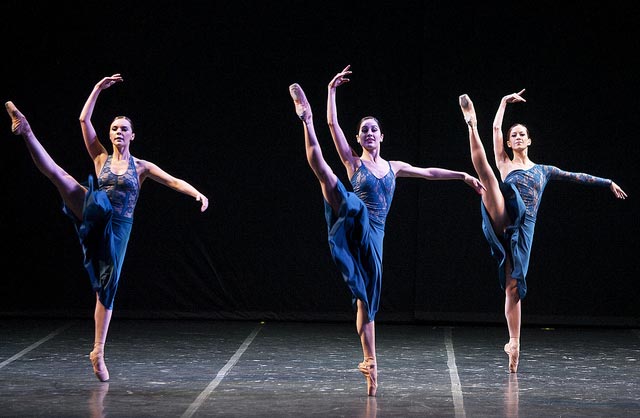I tend to take other people’s opinions to heart, which can be a fantastic quality when I’m getting edits to improve a paper, or if I’m being told by someone in my chemistry course that my lab experiment is super dangerous because I just accidentally added sodium to water and should probably step back to avoid the impending explosion; but my body is not a draft, and it’s not an experiment. It’s not a thing that I, or anyone else, get to look at and say, “Here’s what we need to fix.”
As a dancer, I’m constantly aware of my body. I can picture exactly how I must look to other people at all times during my day, and I would hazard a guess that I spend over half my waking hours consciously thinking about how my body is perceived. It is the perception of other people that fuels me to constantly feel the need to run when I’m exhausted, eat less when I’m hungry, and push my body when I really should take a break.
When I was in preschool, my best friend Athena and I were finger-painting, and lifted our shirts to draw happy faces and flowers all over our stomachs with globby Crayola paint. For fear of sounding cliché, the two of us had literally, lovingly and recklessly turned our bodies into works of art, and then proceeded to proudly wander around, showing our chubby toddler bellies to all our classmates. I ask you, when was the last time that you went around to your friends, proudly showing off your completely un-toned, un-sculpted belly? Somehow, with age, we’ve allowed what we look like to become a key ingredient in a shaming process. We are born with the innate desire to love and care for ourselves. But now we stop wanting what’s best for us, and instead look to what we think others believe we should be.
To start loving our bodies, we need to acknowledge some universal truths. First: Measuring weight as an indication of health is no more rational than predicting meteor showers through populations of porcupines — there is no correlation. Senior year of high school, when I was at my absolute lowest weight, my body had burned through my fat and destroyed my hard-earned muscle. I was miserable. I could not walk on my own, I was on IV drips, I was in the ICU, and I actually hated my body more. Flash-forward to last year: I was heavier, yes, but I could make the long trek from Brown Hall to the ISC merrily with my incredible roommate, run 12 miles at a time, and leap and dance for hours and hours, allowing my body to make art for audiences on internationally competitive stages.
The second universal truth I want you all to be cognizant of is that it is not your privilege to choose your happiest body weight. An eating disorder clinician once told me: “Weight-loss and body sculpting is a man-made fiction. … We think we can play with nature and alter our body composition.” The truth of the matter is that we are born with bodies that are strong and able to know when they are happiest. If you eat whatever your body craves when you’re hungry, work out to keep your muscles strong or relieve stress, and give your body rest, it will happily settle at the weight it’s meant to be. You don’t get to tell your body when you want it to stop gaining or losing. It knows what’s best without our meddling.
I want to leave you with this: At my happiest, who cares if I am not my thinnest? I don’t know how much I weighed when I poured my heart out on the competition stage at world finals with a team who had become my family. I don’t know what the measure of my waist was at the moment that I was surprised with a vase of beautiful flowers from an incredibly sweet guy. All I know is that, in those moments, I felt perfect.
Stop trying to make your body “perfect” and, instead, love your body for all the “perfect” things it makes. Your body is the vehicle for your talents. It houses your voice so you can sing a cappella at Wren 10 (or, if you’re like me, just tone-deafly belt T-Swift songs in your car with friends). Your body includes your hands, which can write, catch, throw, perform titrations in Orgo, hug, sculpt, draw a fierce cat-eye with eyeliner, and pet the baby llamas that come to the Crim Dell Meadow every semester. Instead of trying to make your shell perfect, why not use that time to perfect the things you love passionately — the things that give you life.
What you see in the mirror every morning is not your body. Your body is a beating heart, a fiercely independent mind, and holistically a perfect fit for our One Tribe, One Family, and anywhere else you want to go in life.
Email Dani Aron-Schiavone at draronschiavon@email.wm.edu.

































